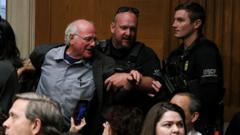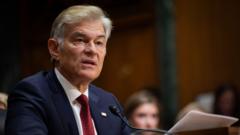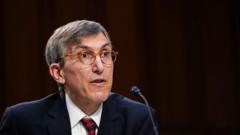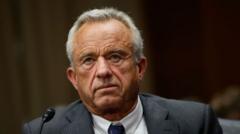The US Department of Health and Human Services (HHS) has announced the cancellation of $500 million in funding for mRNA vaccine projects intended to combat viral diseases, including Covid-19 and influenza. This decision impacts a total of 22 initiatives spearheaded by prominent pharmaceutical companies such as Pfizer and Moderna. Health Secretary Robert F. Kennedy Jr., a noted vaccine skeptic, justified the funding withdrawal by asserting that "mRNA technology poses more risks than benefits for respiratory viruses."
US Health Department Cancels $500M Funding for mRNA Vaccines Amid Controversy

US Health Department Cancels $500M Funding for mRNA Vaccines Amid Controversy
The US HHS opts out of mRNA vaccine funding targeting diseases like Covid-19, stirring debate about vaccine safety and efficacy.
Kennedy's stance has drawn criticism from the medical community, with experts highlighting that mRNA vaccines were instrumental in managing the Covid-19 pandemic and had proven efficacy. A former FDA official, Peter Lurie, voiced concerns about abandoning a vital tool in pandemic preparedness. Kennedy asserted that the future funding would be redirected towards vaccines that reportedly have a better safety profile and adaptability to mutating viruses.
In his defense of the funding shift, Kennedy stated that data indicates mRNA vaccines do not effectively protect against upper respiratory infections and might contribute to viral mutations. However, infectious disease specialists contend that viral mutation is an ongoing process, independent of vaccine presence. Dr. Paul Offit emphasized the established safety of mRNA vaccines and warned that the funding cuts could leave the US vulnerable to future health crises.
Since his appointment, Kennedy has implemented changes in the health department's vaccine guidance, including the dismissal of a committee that manages vaccination recommendations. Critics question the repercussions of his controversial approach, as the nation continues to navigate the aftermath of Covid-19 and prepares for potential future pandemics.
In his defense of the funding shift, Kennedy stated that data indicates mRNA vaccines do not effectively protect against upper respiratory infections and might contribute to viral mutations. However, infectious disease specialists contend that viral mutation is an ongoing process, independent of vaccine presence. Dr. Paul Offit emphasized the established safety of mRNA vaccines and warned that the funding cuts could leave the US vulnerable to future health crises.
Since his appointment, Kennedy has implemented changes in the health department's vaccine guidance, including the dismissal of a committee that manages vaccination recommendations. Critics question the repercussions of his controversial approach, as the nation continues to navigate the aftermath of Covid-19 and prepares for potential future pandemics.




















